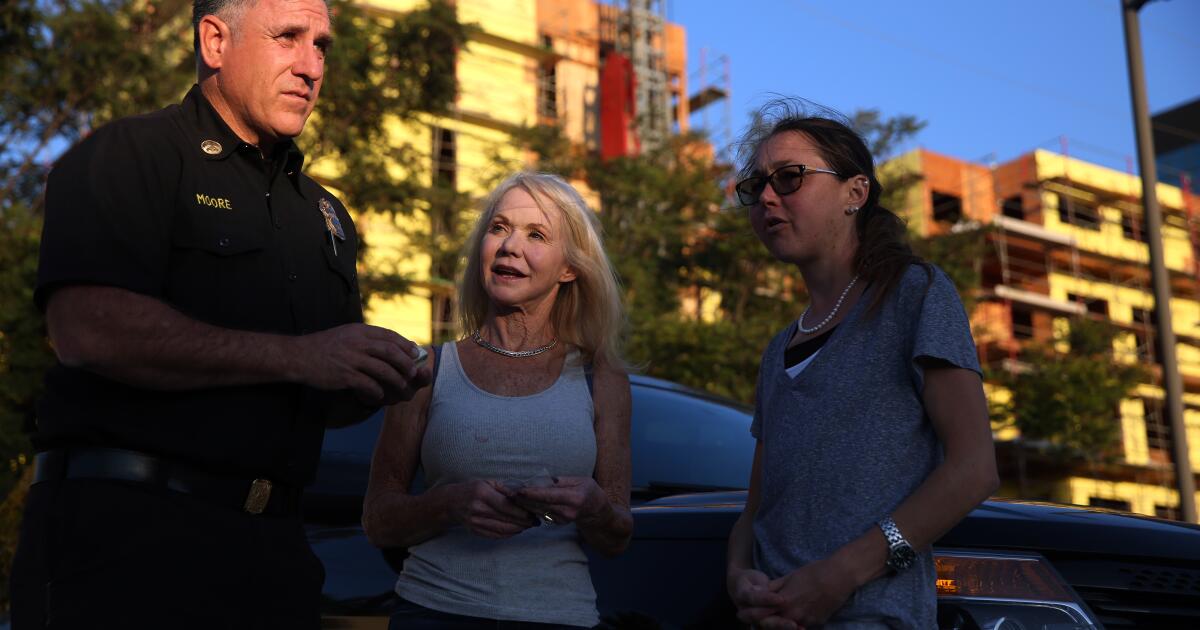A longtime Los Angeles Fire Department leader who is currently the head of the agency’s Valley operations will become the department’s new chief, Mayor Karen Bass announced Friday.
Jaime Moore, currently a deputy chief, will take the reins after a lengthy, nationwide search during which the mayor interviewed fire chiefs of other major cities. Bass also visited firehouses, hearing from firefighters on what they were looking for in a chief.
“I know this year has tested all of us. But I know Angelenos are resilient and strong. I see it every day on the job and I will lead with the same spirit,” Moore said at a press conference Friday afternoon.
The announcement comes just months before the first anniversary of the deadly Palisades fire, and as Republican Senators launch a probe into the city’s handling of the disaster. It also comes weeks after federal authorities revealed that the Jan. 7 Palisades fire was a re-ignition of an earlier fire the department had responded to on New Year’s Day.
Bass said Moore, whom she called “The Professor” because he has taught in the past, will reform the LAFD and prepare it for emergencies and upcoming major events like the Olympics and World Cup.
“Chief Moore is a proven and admired firefighter,” she said. “I know he will work to improve the LAFD for everyone in the city.”
A Los Angeles native, Moore is a 30-year LAFD veteran who grew up speaking Spanish and English, and has said he is proud of his Latino background.
He attended UCLA and got a degree in sociology and earned a master’s in public administration from Cal State Long Beach.
Moore describes himself as a “progressive” fire service leader in his LAFD bio.
“Chief Moore… advocates education, the importance of knowing your job, and promotes empathy towards others and kindness to all,” his bio reads.
Moore has worked as a public information officer and also as the head of the department’s FireStatLA bureau, overseeing performance management at the department.
He also helped create the LAFD’s Equity and Human Resources bureau and has said he is dedicated to improving diversity, equity and inclusion at the fire department.
The decision comes at a pivotal moment for the department as it inches closer to the one year anniversary of the devastating Palisades fire. The department has undergone a series of significant changes since then.
Following the fire, the mayor ousted then-Fire Chief Kristin Crowley, citing the department head’s lack of communication with the mayor as one reason for her demotion. Since then, the department has been run by Interim Chief Ronnie Villanueva.
Following the release of a 70-page city report on the fire response early this month, Bass announced that from now on, Los Angeles firefighters will remain on duty for an additional shift during red flag weather warnings. The mandatory protocol was instituted after top fire officials failed to pre-deploy engines to Pacific Palisades in advance of the devastating Jan. 7 fire.
The department also faces scrutiny of its union, United Firefighters of Los Angeles City, which had numerous members of its top staff suspended over allegations of improper use of the union’s credit cards. The suspended union president announced his plan to sue the mayor Thursday over what he called retaliatory actions by the mayor after he criticized her.
“Chief Moore has shown strong leadership and a deep commitment to the department,” the union said in a statement. “His background and experience within the ranks has demonstrated that he’s the right leader at the right time to move the LAFD forward.”
The union said it looked forward to working with Moore on issues such as staffing, saying that the LAFD is the most “under-resourced” fire department in the country.
While LAFD’s budget went up overall, the fire department also lost certain positions and bureaus this year as the city council tried to balance a $1 billion budget shortfall.
The department’s Diversity, Equity and Inclusion bureau was axed and so were the department’s Emergency incident technicians, who played a key role in coordinating responses to fires.

